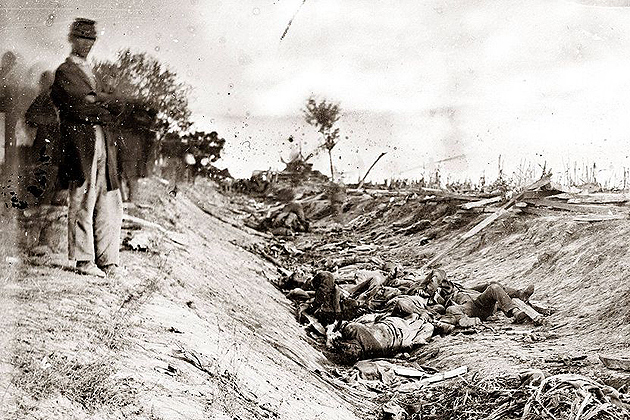
Jeremy Teitelbaum, dean of the College of Liberal Arts and Sciences, is a guest contributor to UConn Today. For his previous posts, click here.
The UConn community has been discussing civility over the past few weeks, and a recent panel discussion led by President Herbst talked about the challenge that incivility poses to our democracy. Whenever I hear a conversation about political civility, I find myself thinking of the U.S. Civil War – the most cataclysmic failure of civil discourse in our nation’s political history, and at the same time the event that redeemed the nation’s commitment to the principle that “all men are created equal.”
Such reflection is particularly timely, because today marks the 150th anniversary of the Battle of Antietam, the bloodiest day of conflict in American history. More than 3,600 soldiers were killed when the Union’s Army of the Potomac under Gen. George McClellan attacked the Confederate Army of Northern Virginia, commanded by Robert E. Lee, at the town of Sharpsburg, Md.

The story of Antietam is tragic, but also immensely frustrating. As Richard Slotkin, in his recent book The Long Road to Antietam: How the Civil War Became a Revolution, explains in devastating detail, McClellan had a deep reluctance to fight, an almost comical arrogance, treasonous political views, and a decided tendency to overestimate enemy forces by a factor of two. Nevertheless, he managed to find himself confronting Lee’s Army of Northern Virginia with twice Lee’s numbers, while Lee’s army was exhausted from forced marches and had its back to a river. By using only a portion of his army and deploying it in pieces, McClellan sacrificed numerical superiority and the advantages of terrain and achieved only a hideously bloody draw. To make matters worse, he failed to pursue Lee’s badly damaged force when it moved south back into Virginia, missing an opportunity to cripple the Army of Northern Virginia and potentially end the war.
Still, Antietam should be remembered now as more than a bloody day of individual heroism under inept leadership. As Slotkin describes, its significance stems much more from its impact on the political environment of the war. During the summer of 1862, as Abraham Lincoln watched the failure of the Union’s Peninsula campaign and struggled to find a general who was both loyal and competent to command the Union forces, he reached the conclusion that he could no longer separate the saving of the Union from the abolition of slavery. To save the Union, he would have to end slavery.

In July of 1862, Lincoln surprised his cabinet with his plan to issue an emancipation proclamation. They urged him to wait for a military victory before announcing it so that it came from a position of strength. Antietam, for all its flaws, was enough of a victory for that purpose, and five days after the battle Lincoln published his preliminary proclamation.
The emancipation proclamation is a deeply equivocal document – Frederick Douglass called it “the first step on the part of the nation in its departure from the thralldom of the ages” – but as Slotkin argues, it was nevertheless revolutionary. From that point on, the civil war was about the abolition of slavery. Through that lens, one can even make sense of the slaughter at Antietam.
Surely it would have been infinitely better if we could have reached the emancipation proclamation, and the 13th, 14th, and 15th amendments, and equal voting rights, and (someday) a truly just society, through a civil political process. But I do not forget that it was a “civil” process that created the 3/5ths compromise and established the United States as a free nation built on slavery – a moral contradiction that was only resolved by a war that took the lives of over 600,000 Americans.
Slavery had to end – it had to – and looking back 150 years to the bloodbath at Antietam, I recall Lincoln’s words: if the war continued, by God’s will, “until all the wealth piled by the bondsman’s two hundred and fifty years of unrequited toil shall be sunk, and until every drop of blood drawn with the lash shall be paid by another drawn with the sword,” then one must still conclude that “the judgments of the Lord are true and righteous altogether.”



